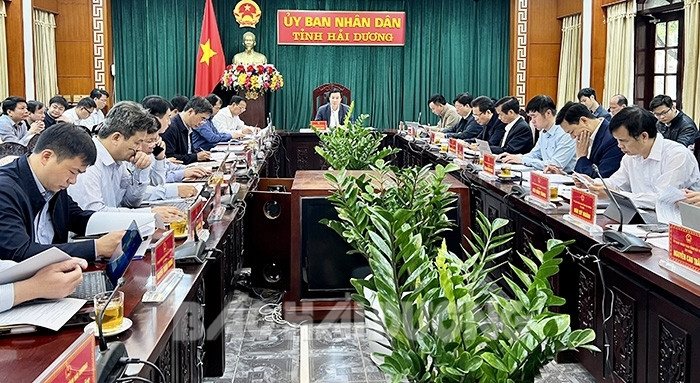Resolution 03/2019/NQ-HDND regulating a number of policies to support the registration of new enterprises in the province in the period of 2019-2022 (referred to as Resolution 03) has expired and still has limitations. Therefore, it is necessary to develop new regulations that are more suitable and effective.

Comrade Trieu The Hung, Deputy Secretary of the Provincial Party Committee, Chairman of the Provincial People's Committee chaired the 8th weekly meeting of the Provincial People's Committee.
On the morning of February 22, Comrade Trieu The Hung, Deputy Secretary of the Provincial Party Committee, Chairman of the Provincial People's Committee chaired the 8th weekly meeting of the Provincial People's Committee to review and discuss a number of contents and reports submitted by the Departments of Planning and Investment, Natural Resources and Environment, and the Provincial People's Committee Office.
At the meeting, the Provincial People's Committee agreed not to continue developing a policy to support newly registered enterprises in the period of 2023-2027 after Resolution 03 expires. Opinions all agreed that the support regulations are necessary to encourage the development of newly established enterprises, but the implementation efficiency in the past time has not been high, and enterprises are not interested. Emphasizing that the support needs to be correct and accurate, avoiding spreading, Chairman of the Provincial People's Committee Trieu The Hung assigned the Department of Planning and Investment, based on the provisions of the Law on Support for Small and Medium Enterprises, Decree No. 80/2021/ND-CP dated August 26, 2021 of the Government, to preside over and coordinate with relevant sectors to advise on the development so that at the mid-year meeting, the Provincial People's Committee will submit to the Provincial People's Council a Resolution regulating a number of contents and levels of support for enterprises in the province in the period of 2023-2027.

Director of the Department of Information and Communications Nguyen Cao Thang explained the low disbursement rate for digital signature certification services for newly established businesses.
To improve the business investment environment and create favorable conditions for enterprises of all economic sectors to establish and develop, on July 11, 2019, the People's Council of Hai Duong province issued Resolution No. 03/2019/NQ-HDND stipulating a number of policies to support the registration of new enterprises in the province in the period of 2019-2022. Accordingly, 100% of the fee for first-time enterprise registration, 100% of the fee for publishing the content of first-time enterprise registration according to the fee rate prescribed by the Ministry of Finance; 50% of the cost of using digital signature certification services will be supported within 1 year from the date the enterprise or business household is granted a certificate of business registration.

Director of the Department of Planning and Investment Le Hong Dien reported on the roadmap for developing a report regulating a number of contents and levels of support for businesses in the province for the period 2023-2027.
After 3 years of implementation (2020-2022), Resolution 03 has achieved certain results, contributing to supporting 2,707 out of a total of 4,593 newly registered enterprises, reducing business start-up costs for enterprises. However, overall, the effectiveness of the policy is not high. The total budget to support enterprises is 341 million VND, only reaching 14.8% of the allocated budget. The reason is that the support level is limited when the business registration fee is 50,000 VND/enterprise and the fee for publishing business registration content is 100,000 VND/time. The support target is narrow, supporting newly established enterprises but excluding cases of performing administrative procedures online while the majority of enterprises use online public administrative services to register for establishment. The selection of a digital signature certification service provider must comply with the Law on Bidding, so the implementation is still confusing and the progress is slow. Currently, there are many digital signature certification service providers with promotional programs for businesses at low costs, long-term contracts of 3-5 years, while the support rate for businesses is only implemented once with 50% of the cost, so it does not encourage businesses to register to benefit.
HOANG LINH